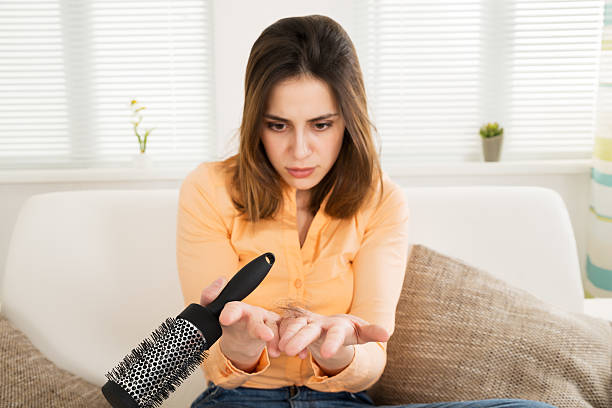
From incorporating a balanced diet to practicing proper hair care techniques, this comprehensive guide provides how to control hair fall and promote healthy hair growth. Say goodbye to hair fall woes with these expert-backed solutions. To control hair fall, maintain a healthy diet and use gentle hair care products. Avoid excessive heat styling and harsh treatments.
Hair fall can be distressing, but several effective strategies can help manage and reduce it. Maintaining a balanced diet rich in vitamins and minerals is crucial for hair health. Include foods high in protein, iron, and omega-3 fatty acids. Using gentle hair care products that are free of sulfates and parabens can prevent further damage.
Avoid excessive heat styling, such as frequent blow-drying or straightening, as it weakens hair strands. Regular scalp massages stimulate blood circulation, promoting hair growth. Also, managing stress through relaxation techniques like yoga and meditation can significantly impact hair health. By adopting these practices, you can effectively control hair fall and improve overall hair quality.
Causes Of Hair Fall

Hair fall can be worrying. Understanding its causes can help you manage it better. Here, we explore the primary reasons behind hair fall.
Genetic Factors
Genetics play a big role in hair fall. If your parents had hair loss, you might too. This type of hair loss is called androgenetic alopecia. It affects both men and women. In men, it often results in a receding hairline or bald spots. Women may notice thinning hair, particularly at the crown.
Lifestyle Choices
Many lifestyle choices impact hair health. Poor diet, stress, and lack of sleep can cause hair fall. A diet lacking in essential nutrients like proteins, vitamins, and minerals weakens hair. Stress leads to a condition called telogen effluvium, where hair prematurely enters the resting phase. Frequent use of heat styling tools also damages hair.
Health Conditions
Certain health conditions contribute to hair loss. Conditions like thyroid disorders, anemia, and autoimmune diseases impact hair health. For example, hypothyroidism slows metabolism, affecting hair growth. Anemia, due to low iron levels, reduces oxygen supply to hair follicles. Autoimmune diseases like alopecia areata cause the immune system to attack hair follicles.
Diet And Nutrition
Hair health starts with proper diet and nutrition. What you eat directly affects your hair. A balanced diet can help control hair fall. Here, we will discuss essential vitamins, protein-rich foods, and hydration.
Essential Vitamins
Vitamins are crucial for hair growth. They help in maintaining hair health. Here are some important vitamins:
- Vitamin A: Helps produce sebum, which keeps the scalp moist.
- Vitamin B: Especially Biotin, which strengthens hair and promotes growth.
- Vitamin C: Helps in collagen production, which is vital for hair strength.
- Vitamin D: Can help create new hair follicles.
- Vitamin E: Improves blood flow to the scalp, promoting hair growth.
Protein-rich Foods
Hair is made of a protein called keratin. Eating enough protein is essential. Some good sources of protein include:
| Food | Protein Content (per 100g) |
| Eggs | 13g |
| Chicken Breast | 31g |
| Greek Yogurt | 10g |
| Tofu | 8g |
| Lentils | 9g |
Hydration
Staying hydrated is crucial for hair health. Water helps in transporting nutrients to hair cells. Drink enough water daily. Aim for at least 8 glasses of water a day. Dehydration can make hair dry and brittle, leading to hair fall. Keep your scalp hydrated by using a good conditioner.
How to Control Hair Fall

Having a proper hair care routine is crucial for controlling hair fall. Following the right steps can help you maintain a healthy scalp and strong hair. Let’s explore some essential practices.
Gentle Shampooing
Use a mild shampoo to wash your hair. Harsh shampoos can damage hair and scalp. Wash your hair two to three times a week.
- Massage your scalp gently.
- Rinse thoroughly to remove all shampoo.
Proper Conditioning
Always use a conditioner after shampooing. It helps to keep your hair smooth and tangle-free. Apply conditioner from mid-length to the ends of your hair.
- Leave the conditioner for 2-3 minutes.
- Rinse with cold water for extra shine.
Avoiding Heat
Excessive heat can weaken your hair. Avoid using heat-styling tools frequently. If you need to use them, apply a heat protectant spray first.
| Heat Source | Alternative |
| Blow Dryer | Air Drying |
| Flat Iron | Hair Serum |
Natural Remedies
Hair fall can be distressing, but natural remedies offer simple solutions. These remedies are safe and effective. They can help reduce hair fall and promote healthy hair growth. Let’s explore some powerful natural remedies for controlling hair fall.
Aloe Vera
Aloe Vera is a miracle plant for hair care. It contains enzymes that promote hair growth. It helps remove dead cells from your scalp. This keeps hair follicles healthy and unclogged.
How to use Aloe Vera:
- Extract fresh aloe vera gel from the leaf.
- Apply the gel directly to your scalp.
- Leave it on for about 45 minutes.
- Rinse your hair with lukewarm water.
Use this remedy twice a week for best results.
Coconut Oil
Coconut Oil is a popular remedy for hair fall. It penetrates deep into the hair shaft. This strengthens hair and prevents breakage. Coconut oil also has antifungal properties. It keeps the scalp healthy and dandruff-free.
How to use Coconut Oil:
- Warm a small amount of coconut oil.
- Massage it into your scalp and hair.
- Leave it on overnight for best results.
- Wash your hair with a mild shampoo the next morning.
Repeat this process 2-3 times a week.
Onion Juice
Onion Juice is rich in sulfur. This helps improve blood circulation to the hair follicles. It also has antibacterial properties. These properties help treat scalp infections and reduce hair fall.
How to use Onion Juice:
- Extract juice from one onion.
- Apply the juice to your scalp using a cotton ball.
- Leave it on for 30 minutes.
- Rinse your hair with a mild shampoo.
Use this remedy twice a week for noticeable results.
Medical Treatments
Hair fall can be distressing. Medical treatments offer effective solutions. These treatments target different causes of hair loss. Below are some popular medical treatments for hair fall.
Topical Solutions
Topical solutions are applied directly to the scalp. They stimulate hair growth and reduce hair loss.
- Minoxidil: This is a popular solution. It promotes hair regrowth.
- Finasteride: Often used as a topical foam. It targets hair loss at the roots.
These treatments can be easily applied. Use them as directed for the best results.
Oral Medications
Oral medications are another effective option. They work from within the body.
| Medication | Function |
| Finasteride | Prevents hair loss by blocking hormones. |
| Spironolactone | Reduces hair loss by balancing hormones. |
Consult your doctor before starting any oral medication.
Hair Transplants
Hair transplants are a surgical option. They are ideal for severe hair loss cases.
- Follicular Unit Transplantation (FUT): A strip of scalp is removed. Hair follicles are then transplanted.
- Follicular Unit Extraction (FUE): Individual hair follicles are extracted. They are then implanted into thinning areas.
These procedures offer permanent solutions. They provide natural-looking results.
Stress Management
Stress can be a major factor contributing to hair fall. By managing stress, you can help reduce hair fall and promote healthy hair growth. Here are some effective stress management techniques to help you control hair fall.
Mindfulness Techniques
Practicing mindfulness can significantly reduce stress levels. This can, in turn, help control hair fall.
- Meditation: Spend 10 minutes a day meditating. It calms your mind.
- Deep Breathing: Deep breathing helps reduce stress. Try it for 5 minutes.
- Yoga: Yoga combines physical and mental exercises. It is great for reducing stress.
Regular Exercise
Regular exercise is important for managing stress. It also promotes overall well-being.
Here are some easy exercises:
- Walking: Walk for 30 minutes daily. It helps clear your mind.
- Jogging: Jogging releases endorphins. It reduces stress effectively.
- Swimming: Swimming is a full-body workout. It relaxes your body and mind.
Adequate Sleep
Getting enough sleep is crucial for stress management. It also aids in reducing hair fall.
| Age Group | Recommended Sleep |
| Children (6-12 years) | 9-12 hours |
| Teens (13-18 years) | 8-10 hours |
| Adults (18-60 years) | 7-9 hours |
Follow these tips for better sleep:
- Consistent Schedule: Sleep and wake up at the same time daily.
- Limit Screen Time: Avoid screens 1 hour before bed. This improves sleep quality.
- Relaxing Routine: Establish a relaxing bedtime routine. It prepares your body for sleep.
Lifestyle Changes
Controlling hair fall often starts with making healthy lifestyle changes. Small adjustments can lead to big improvements. Here are some key lifestyle changes to consider.
Smoking Cessation
Smoking can damage hair follicles. It reduces the blood flow to your scalp. Quitting smoking helps your hair grow stronger. Say no to cigarettes for healthier hair.
Limiting Alcohol
Drinking too much alcohol can weaken your hair. It dehydrates your body and scalp. Limit your alcohol intake to see better hair health. Aim for moderate drinking.
Balanced Diet
A balanced diet is crucial for healthy hair. Include various nutrients in your meals.
- Proteins: Eat eggs, fish, and beans.
- Vitamins: Include fruits and vegetables.
- Minerals: Add nuts and seeds to your diet.
Stay hydrated by drinking plenty of water. A balanced diet nourishes your hair from within.
When To See A Doctor
Hair fall is a common issue. But it can be alarming. Knowing when to seek medical advice is crucial. Early intervention can prevent serious problems. Here’s a guide to help you decide.
Signs To Watch For
Not all hair loss needs a doctor’s visit. But some signs should not be ignored. Watch for these warning signs:
- Sudden hair loss
- Thinning patches
- Scalp pain or itching
- Excessive shedding
- Hair falling out in clumps
Notice any of these signs? It might be time to see a doctor.
Getting A Diagnosis
A doctor can help identify the cause. They may perform several tests. Here’s what to expect:
| Test | Purpose |
| Blood Test | Checks for deficiencies and hormonal imbalances |
| Scalp Biopsy | Examines scalp tissues for infections |
| Pull Test | Determines the stage of hair loss |
Treatment Options
Once diagnosed, treatment can begin. Options vary based on the cause. Common treatments include:
- Medications: Minoxidil and finasteride
- Therapies: Laser therapy and PRP
- Hair Transplant: For severe cases
Consult your doctor to find the best treatment for you.
Frequently Asked Questions
What Are Common Causes Of Hair Fall?
Hair fall can be caused by genetics, stress, poor diet, or hormonal imbalances. Identifying the root cause is crucial for effective treatment.
How Can I Prevent Hair Fall Naturally?
To prevent hair fall naturally, maintain a healthy diet, reduce stress, and avoid harsh hair treatments. Regular scalp massages can also help.
Does Diet Affect Hair Fall?
Yes, diet plays a significant role in hair health. Eating foods rich in vitamins and minerals can reduce hair fall and promote growth.
Can Stress Cause Hair Fall?
Yes, stress can lead to hair fall. Managing stress through relaxation techniques and exercise can help reduce hair fall.
Conclusion
Maintaining a healthy lifestyle and using natural remedies can significantly reduce hair fall. Consistency is key to seeing results. Remember to nourish your hair from within by eating a balanced diet. Regularly follow the suggested tips to keep your hair strong and vibrant.
Embrace these changes and watch your hair thrive.






